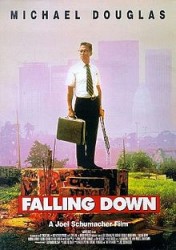by Yayaati Joshi
[box]Falling Down is the tale of the unpredictable antics of a man with misplaced ideologies and a subtle commentary on the society’s descent into chaos, says Yayaati Joshi.[/box]From the first fifteen minutes of the film, it is easy to mistake Falling Down (1993) as a precursor to movies that “celebrated” the angst and xenophobia of the American: say, American History X or 25th Hour (just an uncanny coincidence that both the movies feature Edward Norton). But the distinction about Falling Down is the unabashed portrayal of the frustrated character as a self-made vigilante. It is a story of exaggerated frustrations and blown-out-of-proportion emotional externalities. But it is also a fine tale of how a man fed up of all things in life begins to vent his spleen against whomever he finds unacceptable.
Falling Down is the story of William Foster (Michael Douglas) and his short stint with the expression of his uncontrollable rage against the society. And as much the cool-headed, peace-promoting types would want to revoke Foster’s license to kill, an unbiased viewer would find it hard to ignore the mounting pressures of the minor irritants that life throws at him. That he chooses to still maintain a morally correct stand throughout (the “I won’t start a fight unless I am instigated” policy), does help him find currency with us, as we see him take down one by one, the “scum” of the society. But when you see Foster terrifying a restaurant employee and the other diners because they won’t serve him breakfast at half past eleven, you know that he is no vigilante.
As the day progresses and Foster’s list of atrocities gets longer, the cops are frantically looking for him. One of them, Robert Duvall, on the last day of his duty, is looking to tighten the noose, except that Foster’s movements are so predictable that catching him by using the police manual is impossible. But the running theme of the film is not one of a cat-and-mouse game—it is of a society that is as troubled with both the decadence of the many and liberalist progress of the few. As Foster loiters around the city, he comes across a black man holding a poster that says “Not Economically Viable”, later he meets a shop owner who would not attend respectfully to a gay couple. Foster watches all this with a philosopher’s resignation. We might be confused about Foster’s true motivations, but he himself is not. He refuses to identify himself with a neo-Nazi supremacist, and galled by his antics, ends up killing him. So then, our sympathies keep waxing and waning as the events unfold.
The finest moment of the film comes in a situation that’s as saddening as it is comedic. Having acquired a rocket-propelled grenade, Foster threatens a construction worker. But he does not know how to operate the equipment. Who teaches him, then? An unassuming black kid—straight out of the ghetto, who asks him what’s the name of the movie Foster is working for, and upping the humour ante, Foster replies: “Under Construction”. By now, we know the predictable arc that the plot is likely to take. There’s only so much damage that you can do without getting caught.
If you can set aside the minor quibble of not giving Michael Douglas a powerful, Al Pacino-like monologue, then there are plenty of good reasons to watch the movie. Other than the unpredictable antics of a man with misplaced ideologies, this movie is a subtle commentary on the society’s descent into chaos. Seen differently, this is the best pre-emptive apology, and the most Scorsese-ish one that Joel Schumacher could have given for making Batman kitschy and campy.
Film Freak is an exclusive monthly column by Yayaati Joshi, who, well, is a film freak. It features movie reviews and essays on various aspects of Indian and world cinema.
Yayaati Joshi is a man with simple tastes and intense beliefs. Contrary to the bling associated with the capital city, he prefers the company of close friends, an engaging book or an Alfred Hitchcock movie. His placid demeanour is often mistaken for reticence; Yayaati is a self- proclaimed loner, whose recent pursuits include his foray as a budding writer. Yayaati blogs at http://rantingsofadelusionalmind.wordpress.com






